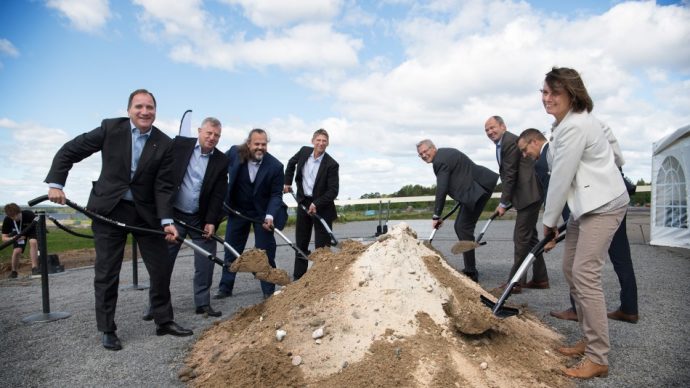Sweden to make clean steel using hydrogen

Is It Real – Clean Steel ?
Making steel is not only very political it is also incredible energy intensive. Typically the dirtiest of fossil fuels have been used to provide the very high temperatures needed to melt and blend the ores and alloys involved. As the U.S. starts to fire up some of the oldest steel furnaces that exist, Sweden has partnered with industry to develop a fossil fuel alternative to making steel.

Using hydrogen this clean steel process may change the way we manufacture steel, aluminum and other alloys. As long as a renewable process is used to generate the electricity needed to split water into hydrogen and oxygen for feedstock to this process, the emissions will be zero.
On June 20th, the ground was broken for HYBRIT’s world-first pilot plant for creating fossil-free steel, with Swedish Prime Minister Stefan Löfven as keynote speaker. SSAB, LKAB, and Vattenfall have, together with the Swedish Energy Agency, decided to invest SEK 1,4 billion in the pilot plant. This means that the HYBRIT initiative now enters its second phase.

The goal is a fossil-free, ore-based clean steel production, on an industrial scale.
Prime Minister Stefan Löfven will today symbolically break the ground for the HYBRIT Pilot Plant in Luleå. The plant is expected to be ready by 2020. The initiative was given the green light this winter to proceed from feasibility study to pilot plant. The construction start means that the HYBRIT initiative is now entering its second phase, with possibilities of full-scale testing and development of the technique to produce steel by using hydrogen instead of coal and coke. This could lead to a historical shift in production technique, leading to water as a by-product instead of carbon dioxide emissions.
By testing in pilot scale, we can leave the small-scale laboratory environment an instead mimic the coming industrial process, and prepare for efficient production. We are very happy to be able to enter the next phase and get one step closer to our target of fossil-free steel production, with all its environmental benefits, says Mårten Görnerup, CEO at HYBRIT.
HYBRIT has the potential to reduce Sweden’s total carbon dioxide emissions by ten percent, and Finland’s with seven percent. Moreover, HYBRIT has a global potential to reduce carbon dioxide emissions. This historic technological shift has been described as crucial for Sweden to be able to achieve the goals set out in the Paris agreement.
HYBRIT is a joint venture company, owned by three companies, SSAB, LKAB and Vattenfall, that aims to be first in the world to develop an industrial process for fossil-free, ore-based steel production. The project was initiated in spring 2016 and the goal is to have an industrial process in place by 2035.
HYBRIT has already been awarded financial support from the Swedish Energy Agency on three occasions, for two feasibility studies and one research project. Moreover, it was recently announced that the Swedish Energy Agency will contribute with SEK 528 million to the pilot plant, in which the three owning companies together will invest an additional SEK 830 million.
Fossil-free steel production starts in the mine, we are working intensely with how the future pelletizing plant should be constructed to find an energy efficient production process. The challenge for LKAB in HYBRIT, and our contribution, is to develop carbon dioxide free direct reduction pellets. This is where the pilot plant will play a crucial part, before we can take it to an industrial scale, says Jan Moström, President and CEO at LKAB.
By starting to build the pilot plant, where we’ll develop and scale up the technology for fossil-free steel production, we’re taking an important step forwards towards SSAB’s goal of being fossil-free by 2045. We’re proud of being part of an important and challenging technological shift that can result in our solving part of the climate issue, says Martin Lindqvist, President and CEO at SSAB.
Magnus Hall, President and CEO at Vattenfall said:
Vattenfall wants to make it possible to live fossil-free within a generation. Helping steel production to change is one of the most important contributions we can give. By using our fossil-free electricity to large-scale production of hydrogen, we can enable technical shifts that will have a great impact on climate emissions.

